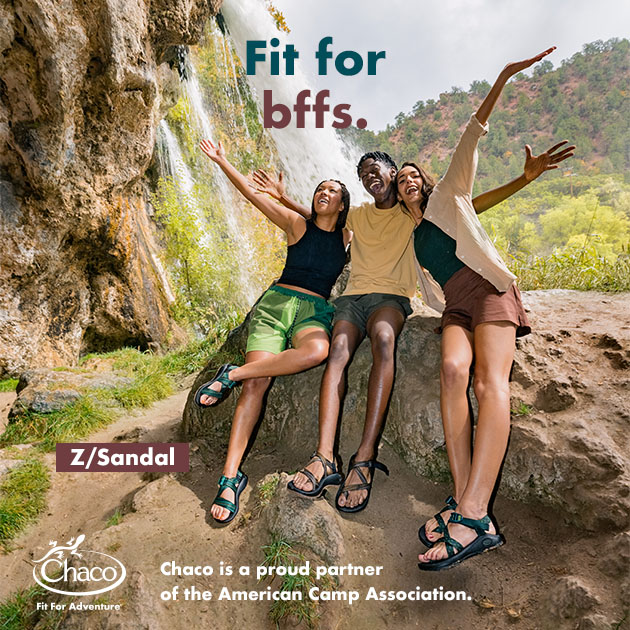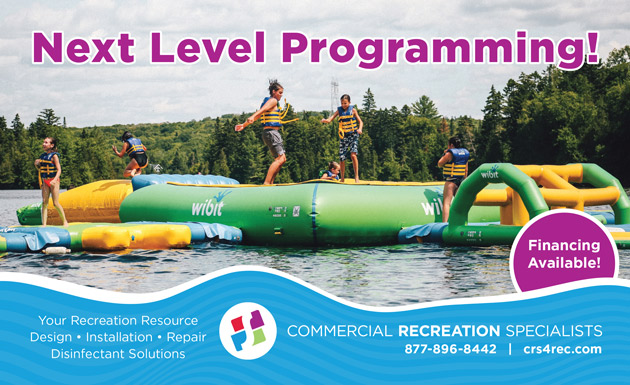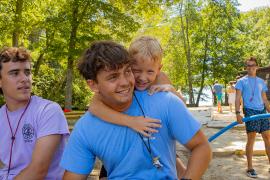There’s a reason many campers and staff return to camp summer after summer. It’s their “happy place.” Many think of camp as a magical, other-worldly destination where they feel happier than they do anywhere else. It’s common, as the session or summer comes to a close, to talk about how sad they’re feeling that camp is ending and/or how much they dread going back to the “real world” or “real life.”
But the experiences and relationships we and our campers have at camp are as real and authentic as life gets. In my research on the impact of camp experiences on campers’ social skills and well-being (aka happiness), campers and their parents were in agreement — most campers feel happier at the end of their time at camp. That’s a fantastic thing!
Now is a great time to think about the routines and habits you’ll model and practice at camp that will be good for your campers’ (and your own) physical and mental health. And that has never been more important. According to an August 2021 meta-analysis, “The prevalence of depression and anxiety symptoms during COVID-19 has doubled, compared with prepandemic estimates” (Racine et al., 2021).
Our campers need the positive, life-affirming experience and the healthy habits of summer camp more than ever. Let’s look at a few of the habits that we can be more informed and intentional about as we head into another potentially life-changing summer with our campers.
Habit #1: Face-to-Face Connection
“In-person reactions to nonverbal, emotional, or social cues are changing in that people don’t need to respond to these types of communication when they are online. This leads to less experience and awareness of others’ needs based on these types of cues that can only be received from in-person communication” (University of the People, 2021).
Among the things we love best about camp are the friends we make and the time we spend with them. Many camp structures foster community and connection. Grouping campers to live and eat together, intentional team-building activities, and even where we set up campers’ beds can all help foster closer connections among campers and between campers and staff.
A key reason many campers report better friendships at camp is that the connections are face to face. Some campers may be uncomfortable with face-to-face interactions after focusing primarily on more impersonal connections through screens. Help your campers by starting group discussions or giving them questions to ask one another, so they can practice the conversational and nonverbal skills necessary for positive relationships.
Habit #2: Get Sufficient Sleep
Did you know that insufficient sleep is prevalent across various age groups, and is considered to be a global public health epidemic (Chattu, 2018)? Lack of sufficient sleep is linked to a wide range of medical issues, including a weakened immune system, a host of chronic diseases and conditions, and poor mental health. For adolescents, insufficient sleep makes them more likely to be overweight and suffer from depressive symptoms.
In comical summer camp-themed movies, staying up all night playing pranks is romanticized as part of the experience. In reality, insufficient sleep for you or your campers has the potential to make everyone miserable and sick. Prioritize making sure your campers get enough sleep by setting up a good sleep routine from the first night at camp.
Here are sleep guidelines for age groups you may serve, as well as for adults (CDC, n.d.):
|
Ages |
Hours of Sleep |
|
6–12 |
9–12 |
|
13–18 |
8–10 |
|
18–60 |
7 or more |
Your camp likely has a scheduled “lights out” time. Consider your routine with your group to allow sufficient time to calm down and get ready to sleep. How early do you need to start the getting-ready-for-bed process? What will be the order and timing of the evening routine? Try it out for a few nights and see how it’s working. Adjust as necessary.
At my camp, after putting out their campfire, campers brush teeth, wash their faces (or take showers), and go to the bathroom. Once they’re tucked in their sleeping bags with a hug or high five, counselors read aloud from a chapter book to help everyone stay quiet and calm down. Campers of all ages enjoy the routine and look forward to finding out what happens in the book. If they are superfast with their teeth brushing, they can sometimes even hear an extra chapter.
Habit #3: Exercise
Most of us are not getting enough exercise, and our sedentary lifestyles are causing or exacerbating physical and mental health problems. This is as true for adults as it is for kids. When I interviewed Jess Shatkin, MD, MPH, one of the country’s foremost experts on adolescent mental health, risk, and resilience and the author of Born to Be Wild: Why Teens Take Risks, and How We Can Help Keep Them Safe, he cited exercise as one of what he calls the “triumvirate of good health” for adolescents. (The other healthy habits are sleep and nutrition.) Shatkin explains, “When people exercise regularly, they feel better about themselves, they feel more competent and more empowered.” These positive outcomes of regular physical activity are important for the campers we serve — and for us.
One of the benefits of camp is that much of the time, the exercise we’re getting is often incidental or just so much fun that we hardly realize we’re getting it. Just walking around camp to meals, activities, and events may be much more exercise than campers have gotten at home. Especially when we practice fun ways of exercising — like dancing — that campers can keep doing at home, we help them develop a positive habit that can improve their well-being.
Habit #4: Spend Time Outside
One of the best habits we practice at summer camp is spending time outdoors, often in beautiful natural settings. In his 2005 book, Last Child in the Woods, Richard Louv coined the term “Nature Deficit Disorder” as a way to describe the “human costs of alienation from the natural world.” He recognized that “human beings, especially children, are spending less time outdoors resulting in a wide range of behavioral problems.” As kids spend more and more time indoors, camp is an excellent opportunity for a reset; a reminder of how fun it is to be outside and how good it makes them feel.
Louv’s 2011 follow-up book, The Nature Principle, extended the conversation to include adults. And if you do a search about getting outside, you’ll discover a whole new field called “Ecotherapy,” which refers to “methods of cultivating the health benefits of being in nature.” As we humans have become ever more connected to the cyber world, we have, sadly, become detached from our natural one.
The research on the benefits of getting outside is clear. It:
Provides stress relief
- Gets our bodies much-needed vitamin D
- Promotes better sleep (see Habit #2)
- Encourages more exercise (see Habit #3)
- Boosts brain health
- Fosters creativity and imagination
- Promotes happiness (WebMD, 2021)
Habit #5: Kindness
Famed college basketball coach John Wooden said, “You can’t live a perfect day without doing something for someone who will never be able to repay you.”
Being a considerate, kind person who thinks about others is a character trait that helps children form good relationships and leads to a happier life as an adult. A focus on kindness needs to be a high priority for everyone who cares about children’s well-being. So this summer, work on developing your campers’ “kindness muscles.” Here are a few ways you can model and practice kindness:
- Get kids to focus on kindnesses they have seen by asking them to point out kind acts they have witnessed or performed.
- Brainstorm with kids about what kind things they can do for others and help them follow through. Focus on small, easy kindnesses rather than huge things.
- Talk with kids about how they feel after someone has done something kind for them or after they’ve done something kind for another person.
Here are some questions you can ask campers to spur conversations about kindness:
- What is something kind you’ve seen someone do this week?
- What’s the kindest thing someone has ever done for you?
- What are kind things we can do for our friends? Siblings? Parents? Strangers?
- How do you want to be remembered by your classmates and friends?
Making Camp Habits Stick
Healthy camp habits often are so integrated into camp life that you may have hardly noticed them before. But now that you’re aware of some of those habits, how can you encourage campers this summer to not only learn them at camp, but to take those healthy camp lessons home for longer-lasting benefits?
As your camp session winds down and campers are getting ready to head home, consider debriefing with them to solidify what positive habits they’ve experienced and practiced at camp. Ask campers to share with each other how they plan to take some of their good camp feelings and habits home — you’ll be amazed by their wisdom.
And know that by exposing your campers to these healthy habits, you’re contributing to their well-being not only this summer, but possibly far into the future.
Discussion Questions
- What icebreaker could you use to get your cabin or group used to face-to-face conversation at camp?
- How might you intentionally incorporate nature into an activity to emphasize the benefits of being outdoors with your campers?
- What additional habits do you think you can reinforce at camp that will help campers (and you) back at home?
References
Centers for Disease Control and Prevention. (n.d.). How much sleep do I need? cdc.gov/sleep/about_sleep/how_much_sleep.html
Chattu, V. K., Manzar, M. D., Kumary, S., Burman, D., Spence, D. W., & Pandi-Perumal, S. R. (2018). The global problem of insufficient sleep and its serious public health implications. Healthcare (Basel, Switzerland), 7(1), 1.
Louv, R. (2005). Last child in the woods: Saving our children from nature-deficit disorder. Chapel Hill, NC: Algonquin Books.
Louv, R. (2011). The nature principle: Reconnecting with life in a virtual age. Chapel Hill, NC: Algonquin Books.
Racine, N., McArthur, B. A., Cooke, J. E., Eirich, R., Ba, J. Z., Madigan, S. (2021, August 9). Global prevalence of depressive and anxiety symptoms in childe and adolescents during COVID-19: A meta-analysis. JAMA Pediatrics. jamanetwork.com/journals/jamapediatrics/fullarticle/2782796
Shatkin, J. (2017). Born to be wild: Why teens take risks, and how we can help keep them safe. New York, NY: Tarcher Perigee.
University of the People. (2021). How has social media affected communication: Facts that surprise. uopeople.edu/blog/how-social-media-affected-communication/
WebMD. (2021). Health benefits of getting outside. webmd.com/balance/ss/slideshow-health-benefits-nature
Photo courtesy of Camp Arrowwood, Sevierville, TN
Audrey Monke, with her husband, Steve, has owned and directed Gold Arrow Camp (Lakeshore, California) since 1989. She is the host of the Sunshine Parenting podcast, which features interviews with parenting authors and experts. Audrey shares resources for parents and youth development professionals about summer camp, parenting, and happiness on her website, sunshine-parenting.com. Her book, Happy Campers: 9 Summer Camp Secrets for Raising Kids Who Become Thriving Adults (Hachette-Center Street, 2019) shares strategies for bringing the “magic” of camp home.




